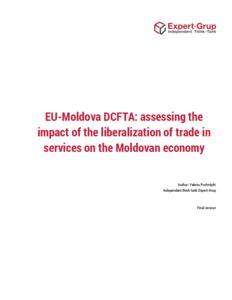
EU-Moldova DCFTA: assessing the impact of the liberalization of trade in services on the Moldovan economy
The year 2014 has been a historical landmark for the Republic of Moldova, as the country has signed with the European Union the Association Agreement. The Agreement enacts a Deep and Comprehensive Free Trade Area (DCFTA). The free trade agreement is ‘deep and comprehensive’ since it encompasses a far-reaching regulatory approximation and market access liberalization, in line with the rights and obligations arising out of WTO membership of Moldova and EU.
As part of the DCFTA, the parties committed to remove import duties for most goods traded and to provide for a broad mutual access to trade in services. The impact of the liberalization of the trade in goods between Moldova and EU has been the subject of many researches (ECORYS 2014, EG 2012, World Bank 2016 (2)). Most of them conclude that the impact is going to be relatively small for the Moldovan economy considering two facts:
Moldova benefited of preferential access to the EU market for most of its goods before the DCFTA;
Moldova already has a liberal trade policy. World Bank (2016 (2)) also includes a preliminary assessment of the impact of the services liberalization.
The key goal of this paper is to shed more light on the expected impact of the liberalization of the trade in services between Moldova and EU within a Computable General Equilibrium framework. The relevance of this framework is obvious if one considers the strength of the downstream and upstream economy-wide linkages that services possess. The model is a one-country model, for the simple reason of the sheer difference in the economic sizes of the EU and Moldova making the economic impact on the EU negligible by any measure. At the same time, the model is dynamic, which allows for satisfactorily taking into account the changes in productive factors endowment and in factors productivity. This is an important feature, because services by their nature are enhancing productivity of the labor and capital. We concentrate on those services that are important as intermediary inputs and not on the services for final consumption (personal travel and tourism, education, health and others alike). Also, we did not include important services sectors, such as environment-related services or trade in oil products, which fall under the Association Agreement, but are not currently covered by the OECD methodology (see below).
The paper is structured in five chapters. Chapter one briefly discusses the relevant literature on the economic role of the trade in services and of trade liberalization. The second one includes key data reflecting the economic role of services for the Moldovan economy. Here we also present our results on the measurement of the international competitiveness of the services Moldova trades. Using a recently developed OECD methodology measuring the Services Trade Restrictiveness Index (Grosso et all 2015), in the third chapter we assess the degrees of services trade restriction of Moldova and EU before and after the implementation of the DCFTA. This methodology approaches in a simple, yet structured way the complexity of barriers hindering international trade in services. We use these results in the fourth chapter to conduct an economic assessment of the changes in the trade regimes induced by the DCFTA within a general computable equilibrium framework. The final chapter concludes and makes a number of policy proposals.